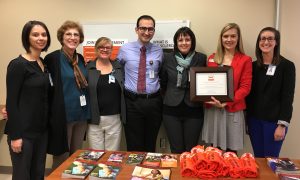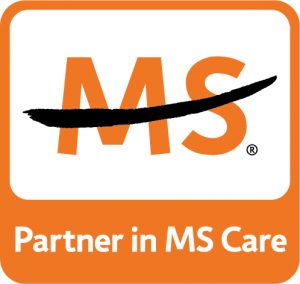The UNC Hospitals Neurology Clinic was officially recognized as a Partner in MS Care – Neurologic Care by the National Multiple Sclerosis Society on February 1. This formal recognition honors the Clinic’s commitment to providing exceptional, coordinated MS care; and a continuing partnership with the Society to address the challenges of people affected by MS.

The UNC Hospitals Neurology Clinic was officially recognized as a Partner in MS Care – Neurologic Care by the National Multiple Sclerosis Society on February 1. This formal recognition honors the Clinic’s commitment to providing exceptional, coordinated MS care; and a continuing partnership with the Society to address the challenges of people affected by MS.

The Society’s Partners in MS Care program recognizes committed providers whose practices support the Society’s initiative of affordable access to high quality MS healthcare for everyone living with MS – regardless of geography, disease progression, and other disparities.
 “We are so proud to partner with the UNC Department of Neurology and the Neurology Clinic to enhance coordinated, multi-disciplinary care for the people who live with MS in North Carolina,” said Heather Grant, Board of Trustees Member, Greater Carolinas Chapter. “In earning this recognition, the UNC clinic has demonstrated extraordinary leadership in MS care, making a tremendous impact on people affected by MS in our community,” Grant continued.
“We are so proud to partner with the UNC Department of Neurology and the Neurology Clinic to enhance coordinated, multi-disciplinary care for the people who live with MS in North Carolina,” said Heather Grant, Board of Trustees Member, Greater Carolinas Chapter. “In earning this recognition, the UNC clinic has demonstrated extraordinary leadership in MS care, making a tremendous impact on people affected by MS in our community,” Grant continued.
“Children and adults with MS require an individualized and comprehensive care. We are dedicated to that mission and are more than proud to partner with the National Multiple Sclerosis Society sharing the same vision: better MS outcomes and better quality of life for persons affected by this disease,” said Dr. Irena Dujmovic Basuroski, from the UNC Department of Neurology, MS/Neuroimmunology Division.
About Multiple Sclerosis
Multiple sclerosis is an unpredictable, often disabling disease of the central nervous system that disrupts the flow of information within the brain, and between the brain and body. Symptoms vary from person to person and range from numbness and tingling, to walking difficulties, fatigue, dizziness, pain, depression, blindness and paralysis. The progress, severity and specific symptoms of MS in any one person cannot yet be predicted, but advances in research and treatment are leading to better understanding and moving us closer to a world free of MS. Most people with MS are diagnosed between the ages of 20 and 50, with at least two to three times more women than men being diagnosed with the disease. MS affects more than 2.3 million worldwide.